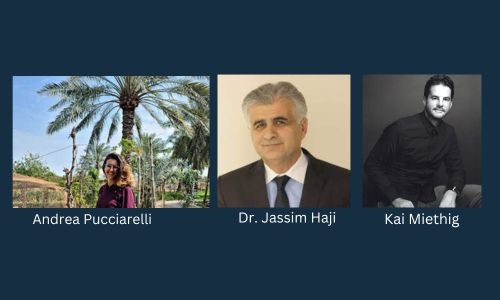AI helpful tool in enriching Bahrain agriculture
TDT | Manama
The Daily Tribune – www.newsofbahrain.com
Report by Julia Cassano
Experts in Bahrain are now looking to other methods, such as artificial intelligence (AI), to support sustainable agriculture as global warming worsens and water scarcity becomes more concerning.
Local farmers in Bahrain are already attempting to adapt to global warming by planting specific plants that require less water, sourcing drought-tolerant seeds, and adjusting traditional farming tactics such as shifting the timing of planting certain crops, Andrea Pucciarelli, manager of Bahrain’s Roots and Shoots Organic Farm, told The Daily Tribune.
"There are many types of plants that need more water than others.
At Roots and Shoots Farm, we aim to produce our own seeds that not only tolerate the weather and water but also produce more with less input," Andrea said.
When discussing the best ways to irrigate crops in the Kingdom, she stated, "Though hydroponics is a good use, the wastewater is not reusable within the system because of the chemicals added to feed the plants, which is where aquaponics is the most eco-friendly method of growing crops. Dr. Jassim Haji, President of the International Artificial Intelligence Group, pointed out how AI can play a role in saving water, especially in places where water is scarce, like Bahrain.
He noted that "precision irrigation systems that use data from sensors and weather forecasts can determine when and where to water crops efficiently, which is crucial for conserving water.
Moreover, using AI models can help experts predict the quality and availability of underground water for irrigation based on historical groundwater levels, rainfall patterns, and soil data.
Dr. Jassim Haji highlighted that the main idea here is to use AI in a responsible way by working closely with farmers. Outlining the specific ways in which AI could improve agriculture in the Kingdom, he highlighted that precise forecasting could help in planning irrigation schedules and protecting crops from extreme conditions such as sandstorms and droughts.
"The goal is to make AI a helpful tool that supports farmers instead of replacing their knowledge," he said. Bahrain-based environmental advocate Kai Miethig concurred with this and cited the less fertile soil, the arid climate, and the anticipated water crisis by 2040 as reasons for using AI for sustainable agriculture in Bahrain.
"Since the usage of water for irrigation is widely required and not much natural rain occurs here, AI technology can help to improve the efficient use of this precious resource.
With the help of technology and AI, the moisture level of the soil could be continuously monitored and watered with the right amount provided rather than by humans excessively and at the incorrect times," he said. However, Andrea Pucciarelli voiced her opposition to using AI in Bahrain’s farming practices.
She explained that it would be challenging to use AI to support the agriculture sector as it relies on already existing intelligence, which is extremely scarce in Bahrain.
Further, she said, "In places like the United States or the United Kingdom, you can find information on how to farm in the zone you are in, including temperatures down to the city you are located, and they will tell you what and when to plant.
Andrea had attempted to use AI to run a hypothetical on what would be required to raise cattle in Bahrain, but it only provided her with incredibly general information, as it doesn’t contain accurate information for this part of the world.
She did, however, suggest programmable techniques that adapt to weather; nonetheless, there are currently other instruments that can be utilised to assist with this. Dr. Jassim Haji also noted this, saying, "There is less historical data and experience to draw from, compared to more temperate regions, as our agricultural techniques tend to be specialised and challenging due to extreme weather conditions.
AI trained on generic data may lack the nuance needed for sustainable desert agriculture. It relies on data to improve over time, and the local data available can be less compared to other more fertile regions.
"Of course, every new technology has its pros and cons. But with proper planning and responsibility, I believe AI can make a real positive impact on sustainable agriculture in Bahrain. The key is taking a universal approach and working closely with local farmers, officials, and environmentalists," Dr. Jassim stated.
Related Posts

